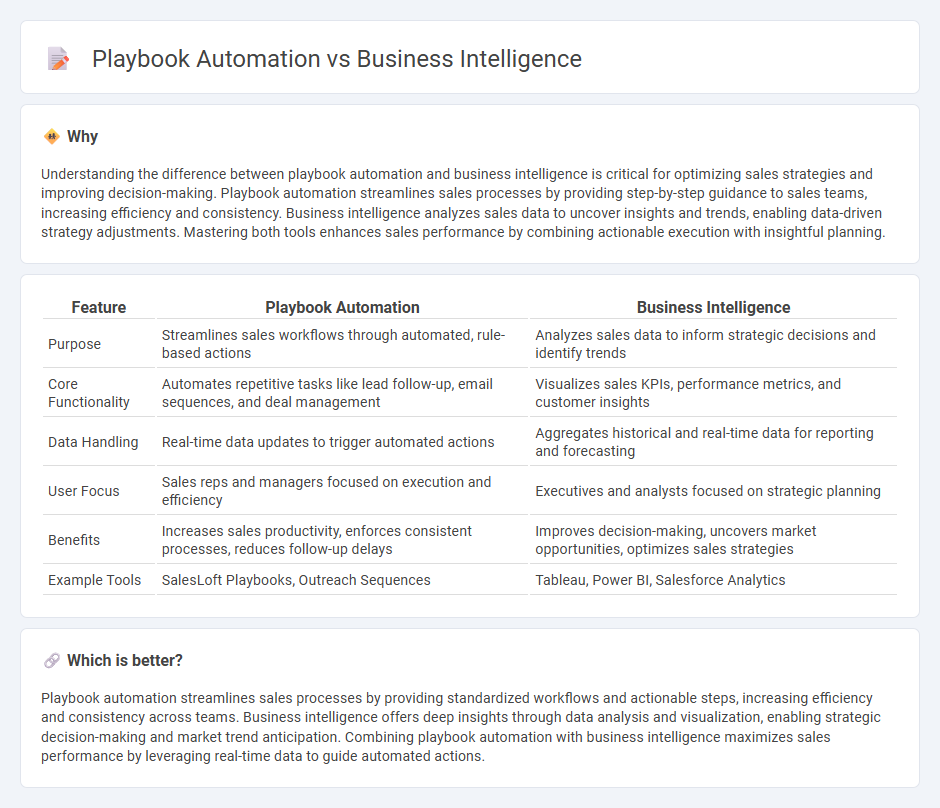
Sales automation streamlines repetitive tasks such as lead management, follow-ups, and reporting, boosting efficiency and allowing sales teams to focus on closing deals. Business intelligence leverages data analytics to uncover customer insights, track sales performance, and forecast trends, enabling smarter decision-making. Discover how integrating sales automation with business intelligence can transform your revenue strategy.
Why it is important
Understanding the difference between playbook automation and business intelligence is critical for optimizing sales strategies and improving decision-making. Playbook automation streamlines sales processes by providing step-by-step guidance to sales teams, increasing efficiency and consistency. Business intelligence analyzes sales data to uncover insights and trends, enabling data-driven strategy adjustments. Mastering both tools enhances sales performance by combining actionable execution with insightful planning.
Comparison Table
| Feature | Playbook Automation | Business Intelligence |
|---|---|---|
| Purpose | Streamlines sales workflows through automated, rule-based actions | Analyzes sales data to inform strategic decisions and identify trends |
| Core Functionality | Automates repetitive tasks like lead follow-up, email sequences, and deal management | Visualizes sales KPIs, performance metrics, and customer insights |
| Data Handling | Real-time data updates to trigger automated actions | Aggregates historical and real-time data for reporting and forecasting |
| User Focus | Sales reps and managers focused on execution and efficiency | Executives and analysts focused on strategic planning |
| Benefits | Increases sales productivity, enforces consistent processes, reduces follow-up delays | Improves decision-making, uncovers market opportunities, optimizes sales strategies |
| Example Tools | SalesLoft Playbooks, Outreach Sequences | Tableau, Power BI, Salesforce Analytics |
Which is better?
Playbook automation streamlines sales processes by providing standardized workflows and actionable steps, increasing efficiency and consistency across teams. Business intelligence offers deep insights through data analysis and visualization, enabling strategic decision-making and market trend anticipation. Combining playbook automation with business intelligence maximizes sales performance by leveraging real-time data to guide automated actions.
Connection
Playbook automation leverages business intelligence data to create dynamic sales strategies tailored to real-time customer insights and market trends. Integrating CRM analytics and performance metrics within automated sales playbooks enhances decision-making accuracy and accelerates workflow efficiency. This synergy drives higher conversion rates by providing sales teams with actionable intelligence and context-specific guidance at each stage of the sales funnel.
Key Terms
Data Analytics
Business intelligence (BI) primarily focuses on collecting, analyzing, and visualizing data to provide actionable insights for decision-making through dashboards and reporting tools. Playbook automation leverages predefined workflows and automated actions to streamline repetitive processes, integrating real-time data analytics for enhanced operational efficiency. Explore how combining business intelligence and playbook automation can transform your data strategy and drive smarter business outcomes.
Workflow Automation
Business intelligence (BI) enhances decision-making by analyzing data trends and generating actionable insights, while playbook automation streamlines repetitive tasks by embedding pre-defined workflows within systems. Workflow automation through playbook automation optimizes operational efficiency by dynamically triggering processes based on real-time data inputs, reducing manual intervention. Explore how integrating BI with playbook automation can transform your workflow automation strategy for maximum productivity.
Sales Enablement
Sales enablement leverages business intelligence by analyzing data to optimize sales strategies, improving decision-making through insights on customer behavior and market trends. Playbook automation streamlines the sales process by providing sales teams with standardized, actionable workflows and best practices to ensure consistency and efficiency. Explore how integrating business intelligence with playbook automation can elevate your sales enablement efforts.
Source and External Links
Business intelligence - Business intelligence (BI) involves strategies, methodologies, and technologies used for data analysis and business information management to enable better decision-making by combining internal and external data sources to identify new opportunities and create competitive advantages.
What Is Business Intelligence (BI)? - BI refers to the technological processes that collect, manage, and analyze organizational data to generate insights that help businesses understand trends, improve decisions, and identify new opportunities, with BI being descriptive and focusing on current data analysis.
What is Business Intelligence (BI)? A Detailed Guide - Business intelligence is a technology-driven data analysis process enabling executives and managers to make informed decisions, using tools like analytics, data visualization, and reporting to improve revenue, operational efficiency, and gain competitive advantage, with trends towards augmented analytics and self-service BI.
 dowidth.com
dowidth.com